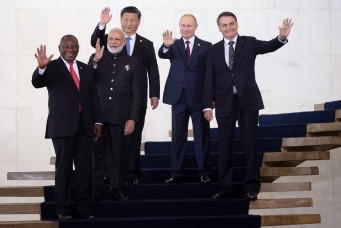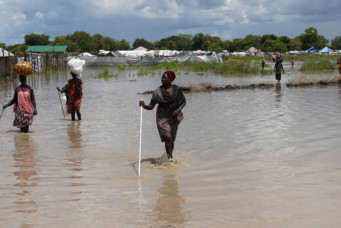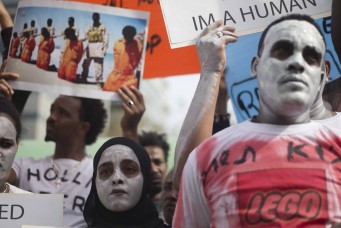South Africa vs. Israel – with Jason Beckett
As the world awaits a much-anticipated provisional measures ruling by the International Court of Justice on the South Africa vs Israel case, we dive into what possible implications would a positive judgement in favor of South Africa have in terms of influencing the set ways of international law and politics, and the actual course of the war in Gaza.
Today’s episode is with Jason Beckett, associate professor of law at the American University in Cairo.

Last month, South Africa brough charges against Israel for violating the the Genocide Convention in the course of its war on Gaza. South Africa said that it, as a party to the convention, has a responsibility to prevent genocide, and asked the International Court of Justice (ICJ) to order provisional measures to protect the rights of Palestinians under the Genocide Convention. The Court then held two public hearings in the Hague on January 11 and 12, hearing arguments from both sides. As attempts to end the war have failed in the Security Council, with the U.S. vetoing a resolution for a ceasefire, what power does the ICJ have over changing the course of the war? And what impact could a positive ruling for provisional measures mean?
Today’s episode is with Jason Beckett, associate professor of law at the American University in Cairo.
Nadeen Shaker: Let me begin by asking you if you can tell us the story of the term genocide, how it came into legal discourse, and why it’s become such a loaded term in international law. Leading up to this case, I know that’s a lot to cover, but how is it important in understanding the South Africa versus Israel case that is before the ICJ today?
Jason Beckett: Okay, so I’m going to take those two questions separately. There’s a question on the history of genocides and there is a question about the court.
And I don’t necessarily think they’re related to one another.
NS: Okay, why do you feel that?
JB: So, genocide as a term, came into being in the mid 1940s. It was coined by the Jewish international lawyer called Raphael Lemkin. And the term was coined as a direct response to the Holocaust. In 1948, under the auspices of the UN, there was a convention adopted on the Prevention and Punishment of the Crime of Genocide. And this feeds into a certain mythology about the Holocaust. And I always want to be careful when I’m talking about the Holocaust. I’m not a Holocaust denier. But I do deny the singularity of the Holocaust.
So the word genocide was created in the mid-1940s and it feeds into this mythology that the Holocaust was a break, a rupture, in history. It was a moment of unique evil. But the only thing that was really unique about the Holocaust, was that it took place in Europe, against an arguably white population.
Famously, in its rule over the Congo, Belgium killed about 10 million Congolese natives.
British rule in India killed over 30 million Indian natives. British invasion and indirect rule in China killed another 30 million Chinese natives. The Holocaust wasn’t even Germany’s first genocide. Germany had previously carried out genocide, I think, in 1908, around 1910, in what is known Namibia, wiping out the Herero people for which they have recently accepted responsibility and initiated a process of restitution.It wasn’t the first genocide in Europe. That was the English genocide in Ireland. So, what I want to say is two things. One, obviously, that genocide is horrible. But two, that it’s wrong to say that genocide is rare or unique.
So genocide, for me, has this mixed history. And this is true of the law of international law.
That there’s an apparent break that we postulate in the 1940s was the creation of the UN and the articulation of modern humanitarian law. And that is framed as a response to the unique event of the Holocaust. So everything starts again in 1945, we reset to be an ethical world.
And then there’s the whole other colonial history of international law and the very simple fact that we never talk about, that the UN was created by the colonial empires. It was created by the colonial states, for the colonial states.So there are very, very different continuities that are very much in contrast to the happy narrative of international law.
Now, coming to the South African case, the reason that I say there is no particular connection, is that I don’t believe that court cases are determined by law, especially in international law. So I have a fundamental belief that international law is radically indeterminate. You can use it to make any argument.
NS: So whatever meaning [legally conferred to genocide] wouldn’t apply because of this indeterminacy?
JB: It applies, but it can be argued either way, that it happened or it didn’t happen. So maybe something I should mention about this ICJ case is that South Africa didn’t choose the charge of genocide to be spectacular or provocative. The ICJ is an unusual court and in particular, states can only be taken before the ICJ if they have previously agreed to its jurisdiction. There are two ways that a state can agree to the ICJ’s jurisdiction. One is a general declaration saying “We accept the jurisdiction of the ICJ in all cases where the other party also accepts the jurisdiction of the ICJ in all cases”.
So the other option is that they are a party to a treaty that grants jurisdiction to the ICJ.
NS: The Genocide Convention….
JB: The Genocide Convention is one of the rare treaties that grants automatic jurisdiction to the ICJ. So we can say, without a doubt, despite what I said about the indeterminacy of international law, we can say without a doubt that Israel is committing war crimes.
We can say, without a doubt, that Israel is committing crimes against humanity. But there’s no court that has jurisdiction to hear those charges. So the International Criminal Court will investigate those charges but in relation to specific Israeli officials, whereas the ICJ determines the responsibility of Israel, the state.
NS: Okay, and you mentioned something interesting that South Africa didn’t mean for genocide, or bringing that claim, to be spectacular. Can you elaborate more?
JB: What I mean, is it was the only treaty that they could use to give the ICJ jurisdiction. They would, from a legal perspective, much rather have pursued a war crimes and crimes against humanity case, because it’s an easier case to make.
Genocidal conduct is clearly occurring in Gaza. You know, I read that 26,500 Gazans have been killed and obviously, that’s horrible, but I also hate the reporting because I think it’s inaccurate. 26,500 Gazans have been recorded dead, it doesn’t count the dead in the rubble. It doesn’t, probably, count not as dying of disease and starvation. So, the number actually killed in Gaza is probably near 40,000.
We’ve seen deliberate attacking of civilian property, deliberate attacks on civilian infrastructure like bakeries, water processing plants. We’re seeing the denial of water, the denial of fuel, the denial of food, the denial of medical care.
I mean, it is honestly a miracle in my view, the only 40,000 Palestinians have died so far. Everything is in position for a major disease outbreak. The people are starving. They have limited access to water. They’re surrounded by sewage. The rains are coming. Much of the water they do have access to isn’t actually drinkable, but they have to drink it anyway. Their immune systems are seriously compromised and they’re all packed together in one dense, massively overcrowded area that has been designated safe and is still being bombed on a daily basis. So the conduct is clearly genocidal.
But the tricky legal question is whether Israel intends to be genocidal. So it’s only genocide if it’s done with the specific intent to destroy, in whole or part, a racial, religious or ethnic group. Israel’s argument is that they have no intention of destroying the Palestinians or the Gazans. Their only intention is to destroy Hamas.But of course, earlier in the war, closer to the October 7th attacks, the Israeli political and military elite were much less guarded in the statements that they were making.
It’s interesting that, particularly since this case was initiated, official Israeli rhetoric has been very much toned down. Although I came across today a quote by Itmar Ben Gvir, who is always good for a quote. He said, “We must continue to subdue, crush and mow down the Nazi enemy in Gaza with all our might.” So he’s pretty clear, he may not be official, but he’s pretty clear that this is a genocide.
Now, I have to say two things that slightly contradict. One is that international law is indeterminate. But two, in this particular instance, it’s probably biased towards Palestine. So, because international law is indeterminate, the advocates at the court have two basic tasks. They have to present the judges a plausible legal argument in their favor and they have to give the judges a reason to want to accept the argument.
To me, the South Africa pleading was stronger, but my sympathies lie with the Gazans, so I was always going to be more sympathetic towards the South African pleading. But the Israeli pleading, particularly on the procedural elements, was very competent.
NS: Can you tell us more what do you mean by the procedural elements? How was it stronger?
JB: So Israel argued a number of different things. They argued that the court did not have jurisdiction. They argued that the remedies requested by South Africa were beyond the court’s competence or had been turned down in similar cases by the court before.
NS: Which is to neutralize Hamas, so bringing back the argument of self-defense, that this is their right.
JB: Yeah, so for example, self-defense is a good one, that they said, “If you demand a ceasefire, you are denying us our right to self defense and worse than that, you’re not telling Hamas to cease fire”, because the court has no jurisdiction over Hamas.
NS: Because it’s not a state?
JB: Yep. So it’s a very technical argument. There is a very technical response, which I wish was articulated more in the media, which is that according to the International Court of Justice, in the case concerning the Israeli apartheid wall, they call it the separation wall, the court ruled that Israel could not act in self-defense in the occupied territories. That as the occupier, they had no right of self defense.
NS: This was brought up in the hearing?
JB: I think it was yes. So if that is true, and as I say that the court has already said that, then Israel actually has no right to self defense in Gaza; we’re talking about this whole thing in the wrong framework.
As I said, both sides did their job competently. So it is now entirely down to the politics and/or the legal beliefs of the 17 judges involved. I think it’s almost certain that it will be a split decision. There will be a very strong dissent from the losing side.
Let me say one last thing before, which is the thing that contradicts my indeterminacy argument. So the case right now is what’s called a “provisional measures case” and this case isn’t designed to establish whether Israel has committed genocide or not. What South Africa has to establish is that there is a plausible argument that Israel is committing genocide.
In both the Myanmar, Gambia-Myanmar case, and Ukraine-Russia cases, the Court has held plausibility to be a very low standard. So, if they follow their own prior decisions, and there’s no guarantee they will, but if they do, then they ought to find in favor of South Africa.
NS: I thought what you said about, you know, how different cases before approached the plausibility issue differently and sort of held it to a lower standard because you know, the situation was so urgent. One of my questions was: do you think that might happen again? It possibly can, but also, if we returned to the question of judges, and the biases of the ICJ that existed from before, do you think that the nationalities of the judges or other political considerations might influence the outcome?
JB: The short answer is yes. The long answer is that it’s more complicated than that.
So if we start from my initial premise, that international law is indeterminate, then international law itself, by definition, cannot determine the decision. So something else determines the decision. But that “something else” is unique to each judge, based on their background, their upbringing, their specific form of legal education, their personal politics, their ethics.
So it is not that I think that judges are direct representatives of their state, but they’re still not applying the law, they’re still applying their own intuition, and then reverse engineering a legal argument that makes that intuition seem determined by law.
NB: You mentioned something really interesting before. In this rare case, the results of the provisional measures might create a space for international law to move past its colonial origins, which you mentioned earlier and you also mentioned in an interview with the Cairo Review. What would that mean, for international law in general, to be aided by the occasional win for the oppressed. What would you know, a favorable outcome meaning?
JB: Okay, so I think there are a couple of things to say here. One, is that I wouldn’t overstate the radicality of a South African victory and two is that I wouldn’t overstate the importance of a South African victory. So, as you mentioned, in my analysis, international law is a colonial or neo-colonial enterprise and I don’t think that this case challenges that in any way.
On the sixth of October 2023, Israel was a settler-colonial apartheid state and international law didn’t care, because it was a well behaved settler colonial apartheid state. On the seventh of October 2023, Israel became a settler-colonial apartheid state that was attacked by the natives. By the eighth of October 2023, Israel was a settler-colonial apartheid state, openly engaged in genocide. Now, that’s the change.
The problem is not that they’re a settler-colonial apartheid state, it’s whether they’re a well behaved settler-colonial apartheid state or not. All this case is saying is, “You’ve transgressed the boundaries of what states are allowed to do”. It’s not challenging the settler-colonial nature of Israel. The court has no power to decolonize Israel. It’s very unlikely, but there’s potentially more radicality, oddly, in the international criminal court.
The international criminal court can investigate war crimes, crimes against humanity, and genocide. One of the crimes against humanity that they could choose to investigate, I don’t think they will, but they could, is apartheid itself. Now, if Israeli leaders were to be imprisoned for running an apartheid state, that would be a much deeper challenge to the logic of international law. The second problem with the ICJ, and the reason I say that the decision isn’t important, is that it won’t be enforced.
It won’t actually change Israeli conduct. The only question, and it’s a very vague, distant hope, is whether it would impact American thinking. America has come out strongly on Israel’s side, but they’ve done it at a factual level, they’ve done it by saying “These claims are baseless, these claims are meritless”. So they aren’t saying, “These claims are not important”. No one can say a charge of genocide is not important. So if the court then finds that the charge is plausible, then it’s harder for the U.S. to say “We want to support Israel, but we’re against genocide”.
NS: It always comes back to the U.S., doesn’t it?
JB: With Israel in particular, yes.
This episode of Podcast Palestine: The War on Gaza was produced by Omar Auf and Abigail Flynn.




